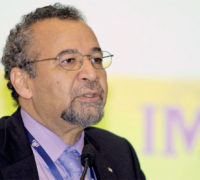
How to manage power dynamics in high-stakes negotiations
Former FBI agent Joe Navarro explains how to leverage non-verbal cues, manage power dynamics, and build trust to overcome deadlocks in negotiations....

by Hischam El-Agamy Published August 25, 2023 in Strategy • 6 min read
The United Arab Emirates is one of the most competitive nations in the world. In IMD’s latest world competitiveness ranking, the UAE made it to the global top 10 when compared with 64 economies along 336 competitiveness criteria.
During the past 25 years, I have witnessed the UAE’s extraordinary transformation up close through my advisory roles and teaching assignments, working directly with the nation’s public and private sectors. Since it is already a leading destination for international companies of all sizes, it is not my place here to offer tips to business leaders. I aim to describe the mindset that has driven the UAE’s transformation thus far. I sincerely believe that to succeed in the UAE, understanding this mindset is essential. Understanding it can help business leaders and investors reinforce their relationships within this country, stimulating more successful ventures and new business opportunities.
Below, allow me to briefly trace the inspiration and four keys to the mindset at work.
The UAE, in its current structure, was founded in 1971-2, bringing together the emirates of Abu Dhabi, Dubai, Sharjah, Ajman, Umm Al Quwain, Fujairah, and Ras al Khaimah. The seven formerly independent emirates were united thanks to a far-sighted leader, the late Sheikh Zayed bin Sultan Al Nahyan — a leader who remains a national and regional role model for his vision, tolerance, and inspiration.
In the decades since, the UAE’s leaders continued to be visionaries in recognizing the importance of diversifying their economy so that it was not overly reliant on oil and gas, a sector mainly concentrated in Abu Dhabi. They invested in technology, state-of-the-art infrastructure, and services. Now, in Dubai and beyond, we find a global hub of commerce, tourism, and innovation. Along with its economic diversification, the UAE’s impressive architecture and commitment to cultural diversity have captured the world’s attention.
The UAE’s expatriate population, made up of more than 200 nationalities, accounts for about 85% of its total population — the highest proportion found anywhere in the world. To compare, Singapore’s expatriates account for little more than 40% of its population.
The Emirati government’s progressive policies have allowed diverse cultures to coexist peacefully, adding appeal for tourists and professionals. Recent government policies are making it easier for expatriates to retire in the UAE and facilitate family reunions.

Preparing for the future with long-term goals in the UAE has come through what I’ll call the four decencies: (1) a clear vision, (2) ambitions for growth with resilience, (3) proactivity, and (4) maintaining a positive outlook. Here is a brief look at each of these four:
Public and private sector leaders show a strong sense of purpose to steer a well-defined vision of their desired outcomes. For motivation and direction, they continuously communicate the “why” behind transformations, which also builds trust and helps retain focus during difficult times. We saw how the UAE managed to remain one of the few open countries during the pandemic. In 2021, while most countries still struggled with their COVID crises, Dubai ran a very successful EXPO 2020 (postponed one year), attracting more than 24 million visitors from more than 190 countries.
Successful businesses in the UAE see challenges as opportunities, reframing setbacks as learning experiences. For example, the multinational DP World, based in Dubai, was created in 2005 and today is one of the world’s major players in a highly competitive industry, with 103,000 employees working across 75 countries. Ever since the early stages of its expansion, DP World has had to deal with varying political landscapes and regulatory frameworks in upgrading infrastructure, including in less developed regions with limited resources. I see DP World continuing with its “growth with resilience” mindset as it manages other critical issues, such as environmental and wider sustainability concerns.
Another pair of examples are two Emirati national airlines, Abu Dhabi-based Etihad and Dubai-based Emirates. Both are among the top-ranked airlines in the world; in fact, Emirates is ranked among the world’s top five this year. They both continue investing in improving efficiency, expanding their networks strategically, and offering premium services that have contributed to their successes, even in difficult times.
Instead of waiting for opportunities to come their way, the UAE’s business leaders tend to adopt a proactive mindset. They actively seek ways to create opportunities and drive change to shape the future. For instance, in recent years, the UAE has placed more emphasis on sustainable development and environmental preservation. Investments focus on renewable energy, including building the largest solar park in the world. The UAE plans to triple its current renewable energy supply and invest up to $54 billion over the next seven years to meet its growing energy demands. This includes investments in low-carbon hydrogen as well as electric vehicles’ infrastructure.
The UAE’s ambitious initiatives – namely, “UAE Vision 2021” and “UAE Centennial 2071” –prioritize its knowledge-based economies, advanced technologies, and social development to ensure a bright future for generations to come.
Investments look far into the future, with optimism. For example, the Abu Dhabi Investment Authority (ADIA), established in 1976, is now one of the largest sovereign wealth funds in the world. Its highly diversified portfolio spans geographies with a structured yet flexible approach that balances a long-term focus with an ability to respond quickly, if appropriate, when new opportunities arise. In another future-positive project, the UAE Space Agency has launched its first mission to Mars, with a spacecraft named Hope. The government aims to use the program to help play a role in transforming global science, the nation’s space sector, and its economy.
At the same time, the UAE business community tends to focus on long-term goals while also placing a strong emphasis on long-lasting relationships, trust, and commitment, as most of the companies in the country are family businesses. Family-owned businesses contribute about 60% of the GDP and account for about 80% of employment opportunities.
Looking back on 50 years of impressive transformation, I also see the UAE’s leaders proactively looking for solutions to tomorrow’s concerns. Understanding this mindset is key to grasping what might be possible next.

IMD Executive Director, Middle East, Africa and Turkey
As Executive Director of IMD, Hischam El Agamy is responsible for IMD’s activities in Africa, the Middle East, and South-Central Asia, where he teaches and leads development programs. El Agamy’s expertise and teaching experience include scenario planning, business transformation, family business transformation, public-private partnership, and stakeholder engagement. He teaches regularly in IMD custom programs and has taught several IMD open programs, including its EMBA and MBA programs.
For over 14 years, El Agamy has occupied various international functions in seven European countries as part of a long career with major Swiss multinational corporations in Zürich. During these years, he has driven a number of business transformation initiatives in several European countries.
He has contributed to several advisory assignments for governments in the Gulf region and in the area of competitiveness and human capital development for the government of South Africa.
El Agamy obtained two master’s degrees in applied science from the University of Fribourg and Lausanne in Switzerland. He received his Doctorate from the University of Pierre & Marie Curie in Paris.

May 6, 2025 • by Anna Cajot in Competitiveness
Former FBI agent Joe Navarro explains how to leverage non-verbal cues, manage power dynamics, and build trust to overcome deadlocks in negotiations....

April 24, 2025 • by Jerry Davis in Competitiveness
Many regional developers have tried and failed to emulate Silicon Valley’s VC-driven model for innovation. Detroit, the birthplace of Ford, is following an alternative route – with promising results....
 Audio available
Audio available
April 16, 2025 • by Benoit F. Leleux in Competitiveness
How a private equity-backed corporate carve-out created a successful, sustainable consulting powerhouse...

April 11, 2025 • by Jim Pulcrano, Jung Eung Park, Christian Rangen in Competitiveness
Founders searching for funding must be targeted in their approach to securing a lead investor. A global survey of VCs offers valuable insights into what makes them tick....
Explore first person business intelligence from top minds curated for a global executive audience